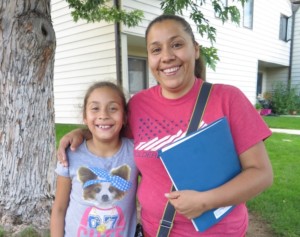Out of Poverty Into Opportunity

By: Dr. Idit Harel Caperton
Mobilizing Underserved Communities to Take Their Place in the Digital Economy
At the NewSchools Venture Fund SUMMIT2012 (in collaboration with The Aspen Institute) this May in San Francisco, NewSchools CEO Ted Mitchell gave an inspiring address to one thousand members of America’s leading education reform movement.
Ted Mitchell got me thinking. When we talk about lifting American children out of poverty—and there are fifteen million poor kids in the United States—our first thought is naturally about filling the basic needs of food, shelter, health care and social supports. Mitchell’s remarks remind us that it may be time to expand our notions of what constitutes “basic needs.” Today’s kids, regardless of their socioeconomic status, need a set of critical abilities that will ensure that they continue to thrive in a rapidly changing global society. Education leaders are beginning to see this too.
Over the past couple of years, model initiatives in several of the nation’s most challenged communities have put in place the infrastructure, learning culture, and innovative instructional techniques one might expect to see at leading research universities like MIT or Stanford. The aim of such initiatives is to show how to help students in those communities build self-confidence and expertise that can position them for driving their own productive lives, and leap into projects and careers in some of the fastest-growing sectors of the digital economy.
The successes have been eye-opening. Here are two examples from two very different communities, one Eastern, rural, with a predominantly white population; the other a Southwestern inner city with a predominantly Hispanic population. Yet, the outcomes have been remarkably similar.
Connecting Rural Students and their Teachers to Each Other and the World
![photo[3]](https://www.gettingsmart.com/wp-content/uploads/2012/05/photo3-216x290.jpg)
“Most of our students don’t have Internet at home, and those who do usually deal with dial-up,” noted McDowell County educator Ingrida Barker in a video interview in 2008. Barker and her colleagues were among the first West Virginians to start using Globaloria, a learning network and game design curriculum that teaches students programming, empowering them to create their own videogames. They learn to ask questions, conceive an original idea, work in teams, access knowledge from various sources and edit and finalize a polished, working game for presentation.
(Ingrida Barker, West Virginia): West Virginia educator Ingrida Barker discusses her experiences with the Globaloria game design curriculum.
Globaloria is a personalized and blended approach to learning, and one that is easily customizable for students with learning difficulties, as well. “This course helps kids build the skills necessary for competition in a global workplace, collaboration, working globally and communicating with their peers not only across the state but across the world,” said Barker in an interview. She also wrote about this experience in a report.
Fast forward four years. Barker, who began as a social studies teacher in a middle school and was admittedly inexperienced about digital teaching, underwent her own substantive professional development as a result of her involvement with Globaloria. She mapped out a new classroom configuration, collaborated daily with teachers in distant parts of West Virginia and learned new skills with experts from New York City.
Today, Barker is a supervising assistant principal of curriculum and instruction in one of McDowell County high schools, and studies for a doctorate degree at Marshal University on weekends. In that capacity, she is deeply involved with Reconnecting McDowell, a new initiative that is determined to build on the groundwork laid down by a range of visionary educators to address the many complex challenges facing this community.
The initiative is led by the President of the American Federation of Teachers, Randi Weingarten; by former West Virginia first lady and West Virginia Board of Education Vice President Gayle Manchin; and by West Virginia Governor Early Ray Tomblin, and it works in partnership with Frontier and Cisco and many other local and national organizations. Central among its objectives is the creation of a broadband infrastructure which Frontier Communications will be providing to schools throughout the county—enabling students, educators and citizens to benefit from a cutting-edge curriculum like Globaloria.
McDowell County has a long road to travel to overcome the intertwined challenges of poverty, underperforming schools, limited medical services and inadequate access to technology and transportation. Yet several thousand students have already benefited—as demonstrated by research on improved scores on math and science assessments, programming skills, and preparation for college and career success— from educators’ courageous investment, as described in these multi-year reports.
Transforming a Community from the Ground Up in East Austin, Texas
Education entrepreneur Dr. Juan Sanchez, nationally recognized leader in the field of youth programming and founder of the nation’s fourth largest Hispanic-led nonprofit, Southwest Key, saw the Globaloria game design curriculum as a way to build STEM knowledge and college readiness among all students at East Austin College Prep Academy (EAPrep). This charter school is located in the heart of the East Austin Barrio and draws from a diverse and underserved local population of students, who are eighty percent Latino, twenty percent African American and forty percent English language learners. What made Globaloria particularly pertinent was that it was also a method for helping those students address some of the challenges facing their community, as they are tasked to focus their games on the social, economic, and environmental issues they see around them.
“In a community…where there is so much poverty and unemployment and a history of neglect, we believe that if we can send these kids to college we will eventually eliminate poverty here,” notes Dr. Sanchez in a video interview. He and his colleagues decided to implement Globaloria as a full-time component of the daily curriculum of every student. “We’re using Globaloria as a way to address math, science and English. It also addresses the issue of community service and connecting our school to the community these people live in and they come from, and it tries to address the problems that these young people confront in their lives every day,” Dr. Sanchez shares his vision for EAPrep.
(Dr. Juan Sanchez, Texas): Education entrepreneur and Southwest Key founder Dr. Juan Sanchez discusses the power of the Globaloria program
Preliminary research results at EAPrep have shown improvements in students’ technological capabilities—particularly in their abilities for problem-solving and self-expression in digital media. The results also demonstrate improved performance on standardized assessments in math and critical thinking objectives, and they evidence increased motivation for learning technology skills. Students also show a particular interest in pursuing the kind of STEM careers that have the potential to lift themselves and East Austin out of poverty.
Stepping into Opportunity through Increased Computational Abilities
What the experiences in McDowell County and East Austin make abundantly clear is that kids from any low-income background — urban or rural — are willing and able to acquire the most sophisticated digital literacies, computational skills and analytical capabilities they need for constructing their own economic future—skills as critical as the basic food and health services needed to sustain them physically. All that holds this generation back is the lack of opportunities to learn in new and relevant ways, and since the economic future of our nation as a whole depends upon these children, it is up to us, education leaders and entrepreneurs, to make sure they get this rich intellectual diet, in all of America’s zipcodes and in our rural, urban, charter and public schools.
Dr. Idit Harel Caperton, a Huffington Post writer, is an Israeli-American entrepreneur and founder of the non-profit World Wide Workshop.







Louise Anderson
Dr Idid How can I start a school like yours in South Africa. Specialy to break the poverty cycle by helping the children to qualify on computers wich they love.